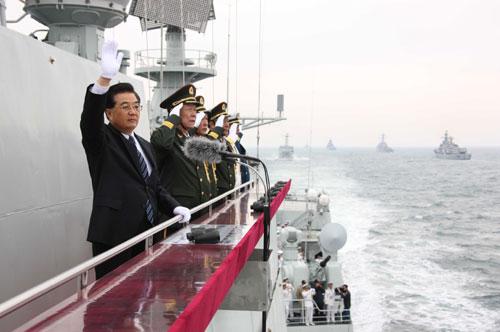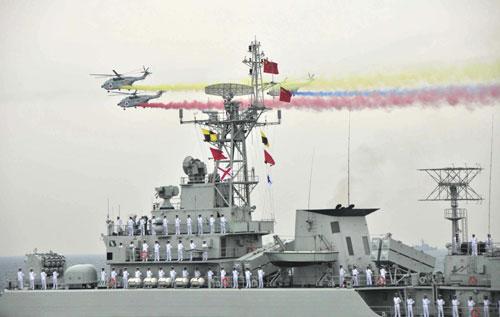BEIJING, April 23 (Xinhua) -- After more than a year of preparations beneath local residents' eyes, an international fleet review massed in the water through which foreign warships entered China with opium in the 1890s.

Chinese President Hu Jintao (L) waves to the navy vessels which are being reviewed while aboard the destroyer Shijiazhuang in waters off Qingdao, east China's Shandong Province, April 23, 2009. A parade displayed 25 naval vessels and 31 aircrafts of the PLA Navy, including two nuclear submarines, as part of a celebration to mark the 60th anniversary of the founding of the PLA Navy.(Xinhua/Wang Jianmin)
There were limited options for the nation, which at the time was hiding behind its walls, to stake claim to its maritime interests on a planet three-quarters covered by water.
The People's Liberation Army Navy, which grew from little more than several abandoned Kuomintang ships, learned during coastal fights in its infancy that peace has a high price.
Seriously considering becoming a real blue-water force, the Navy was urged to increase its capabilities to match the nation's international status after making a transition from inshore protection to offshore defense.
In the naval sail-by of an international fleet off the coast of Qingdao in the Yellow Sea, 50 warships met up Thursday to seek a harmonious ocean, the same goal of another group of navies massed through international cooperation in the Gulf of Aden.
Marking the Navy's 60th anniversary amid an economic slowdown can redeem national pride in the waters where corrupted and occlusive Qing Empire left a history of humiliation for bending to overseas colonists aboard gunboats.
During seven voyages by Zheng He (1371-1433), China's own Christopher Columbus-like navigator, what was then the largest flotilla in the world imposed neither a colonial treaty nor claimed a piece of soil.

A naval parade of the Chinese People's Liberation Army (PLA) Navy warships and aircraft is held in waters off China's port city of Qingdao, east China's Shandong Province, on April 23, 2009. (Xinhua/Li Gang)
An increasing presence offshore China's 18,000-kilometer mainland coastline might raise concerns among neighbors. However, it is imperative for the world's fastest-growing economy, which must -- despite the global downturn -- protect its cargo and awake citizens to its sea power.
The UN Convention on the Law of the Sea truly endows China with the right to claim maritime interests, but the country cannot shirk its obligation to acquire the military power to secure those rights.
With President Hu Jintao aboard the inspection warship in the fleet review, the Navy took a new step forward in shouldering more responsibility for the nation's peaceful development.
Related News
Photos
More>>trade
- Reception held to mark 60th founding anniversary of FAO, MND
- China opposes U.S. arms sales to Taiwan: Chinese defense chief
- China's military development poses no threat: defense minister
- Talks help promote healthy, steady Sino-U.S. military ties: Chinese defense
- China, Indonesia to step up defense cooperation: ministers
market
finance
- Chaohu warship sets multiple ocean-going escort records
- Senior Chinese, U.S. military officials to exchange visits in 2011
- PLA three services in actual-combat assessment
- Frontier defense officers and men dressed with fit uniform
- New-type field first-aid equipment debuts in immense forest and snowfield





